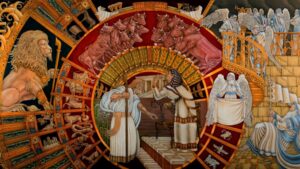A young Frenchman named Christophe kneels for a long moment, as though in prayer but perhaps only in thought, at the grave of Marcel Proust. When he stands, I ask, “Did you know Proust was Jewish?”
“No,” he says, but then notices the name of Proust’s mother engraved on the side of her famous son’s tomb: Jeanne Weil Proust, 1849-to-1905. “Ah,” he says on a recent February morning at the Père Lachaise Cemetery, a 110-acre graveyard with some of the most disturbing monuments to Holocaust victims I’ve seen.
Here in the first European nation to emancipate its Jewish population, Proust’s father was a Catholic. Though the family was not religious, Proust’s parents had the future author of “In Search of Lost Time” baptized to please his paternal grandparents.
I ask Christophe if he’s familiar with another Parisian author with one Jewish parent – Patrick Modiano, winner of the 2014 Nobel Prize, who’s hailed as a modern Proust. The young man does not know Modiano, who was born within months of the Third Reich’s surrender. The haunted chronicler of Nazi occupation and Vichy collaboration, Modiano is author of the book I carry through the cemetery, “La Place de l’Etoile,” a farce of Jewish identity published a half-century ago. The book’s title refers simultaneously to the traffic circle at the Arc de Triomphe and the yellow star Jews were forced to wear during the Nazi occupation.
The novel bends and blends the lives of famous French Jews and Jewish history, while the trickster narrator, Raphael Schlemilovitch, posits, “The Jew would not exist if goys did not condescend to notice him.” And Holy Moses, how the Jew is noticed, glorified, dismissed, pimped, tortured, humiliated and murdered in Modiano’s surrealistic send-up, which I brought from Baltimore as a guide preferable to Fodor’s.
I schlepped the novel from the boneyard of Proust, Sarah Bernhardt and Edith Piaf to a Middle Eastern repast in The Pletzl — the “little place” in Yiddish, the Jewish quarter in the City of Lights and home to Jews of varying numbers since the late 19th century. Those numbers plummeted during World War II death camp roundups. And the story of how Piaf used her extraordinary singing talent to trick the Nazis into saving French Jews consigned to concentration camps is a tale worth a thousand tellings.
In The Pletzl — near three Orthodox shuls, across from a Jewish bookstore and around the corner from a gang of proselytizing Lubavitcher boys drinking pre-sunset Heinekens on a Friday afternoon — I lunched during snow flurries at Chez Marianne on Rue des Hospitaliéres St. Gervais.
There, between a floor-to-ceiling wall of wine and a wall of olive oil, I met a young artist named Thibault Gayet, who came to the café with friends because the place is as renowned for its falafel as Pariser’s is for cupcakes. A painter and a sculptor, Gayet is a gentile who has done serene renderings of the parting of the Red Sea, a Frenchman who believes there will always be a vibrant Jewish presence in Paris despite centuries of anti-Semitism and recent waves of terrorism that sent many families to Israel and London.
An observant friend of mine originally from Pikesville — a journalist with three young children — married a Jew from Germany and together they keep a kosher home in London. Now and again, they take The Chunnel to Paris. Though she can’t say exactly why, she feels safer in London.
Gayet says a big difference in The Pletzl today from the time of his childhood some 20 years ago is the presence of soldiers patrolling the neighborhood with automatic weapons.
“It’s still a neighborhood, a real [Jewish] neighborhood, but the price of real estate means less people can own or rent here,” says Gayet, when asked if the area was merely a place for tourists to get a taste of what is gone. A millennial, Gayet believes the majority of his generation of Parisians “respect people’s beliefs.” Then again, “a few are xenophobic. They hate everybody who is not like them, including Jews.”
Including? Perhaps he meant, “Especially.”
Or as Raphael Schlemilovitch put it, “My love of uniforms has never brought me luck … ”
 Rafael Alvarez hosts monthly “Readings with Ralphie” at the Bird in Hand restaurant in Charles Village. He can be reached via orlo.leini@gmail.com
Rafael Alvarez hosts monthly “Readings with Ralphie” at the Bird in Hand restaurant in Charles Village. He can be reached via orlo.leini@gmail.com
Read more May Travel stories:
- How to Do Nothing at Chincoteague
- Iceland in February — A Great Spot for Geology Geeks
- Find yourself…in the Poconos
- Fruits, Labor and the Language of Love in Italy
- Journey to the Heart of Africa
- Costa Rica’s Charms
- Pristine Beaches, Walkabouts and Charm Await on Nantucket


